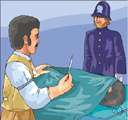coroner
Also found in: Thesaurus, Medical, Legal, Acronyms, Encyclopedia, Wikipedia.
coroner
an officer who investigates by inquest any death not clearly resulting from natural causes
Not to be confused with:
corner – the place where two converging lines or surfaces meet; an end; margin; edge
Abused, Confused, & Misused Words by Mary Embree Copyright © 2007, 2013 by Mary Embree
cor·o·ner
(kôr′ə-nər, kŏr′-)n.
A public officer whose primary function is to investigate any death thought to be of other than natural causes.
[Middle English, officer of the crown, from Anglo-Norman corouner, from coroune, crown, from Latin corōna; see crown.]
cor′o·ner·ship′ n.
Word History: Coroner comes from Anglo-Norman corouner, a word derived from coroune, "crown." Corouner was the term used for the royal judicial officer who was called in Latin custos placitorum coronae, or "guardian of the crown's pleas." The person holding the office of coroner, a position dating from the 12th century, was charged with keeping local records of legal proceedings in which the crown had jurisdiction. He helped raise money for the crown by funneling the property of executed criminals into the king's treasury. The coroner also investigated any suspicious deaths among the Normans, who as the ruling class wanted to be sure that their deaths were not taken lightly. At one time in England all criminal proceedings were included in the coroner's responsibilities. Over the years these responsibilities decreased markedly. In the United States, although there is no longer any crown, a coroner's main duty is the investigation of any sudden, violent, or unexpected death.
American Heritage® Dictionary of the English Language, Fifth Edition. Copyright © 2016 by Houghton Mifflin Harcourt Publishing Company. Published by Houghton Mifflin Harcourt Publishing Company. All rights reserved.
coroner
(ˈkɒrənə)n
(Law) a public official responsible for the investigation of violent, sudden, or suspicious deaths and inquiries into treasure trove. The investigation (coroner's inquest) is held in the presence of a jury (coroner's jury). See also procurator fiscal Compare medical examiner
[C14: from Anglo-French corouner officer in charge of the pleas of the Crown, from Old French corone crown]
ˈcoronerˌship n
Collins English Dictionary – Complete and Unabridged, 12th Edition 2014 © HarperCollins Publishers 1991, 1994, 1998, 2000, 2003, 2006, 2007, 2009, 2011, 2014
cor•o•ner
(ˈkɔr ə nər, ˈkɒr-)n.
an officer, as of a county or municipality, whose chief function is to investigate by inquest, as before a jury, any death not clearly resulting from natural causes.
[1225–75; Middle English < Anglo-French corouner supervisor of the Crown's pleas =coroune crown + -er -er2]
cor′o•ner•ship`, n.
Random House Kernerman Webster's College Dictionary, © 2010 K Dictionaries Ltd. Copyright 2005, 1997, 1991 by Random House, Inc. All rights reserved.
coroner
A public official who holds an inquest to investigate any sudden or suspicious death.
Dictionary of Unfamiliar Words by Diagram Group Copyright © 2008 by Diagram Visual Information Limited
ThesaurusAntonymsRelated WordsSynonymsLegend:
Switch to new thesaurus
| Noun | 1. |  coroner - a public official who investigates by inquest any death not due to natural causes coroner - a public official who investigates by inquest any death not due to natural causesinvestigator - someone who investigates |
Based on WordNet 3.0, Farlex clipart collection. © 2003-2012 Princeton University, Farlex Inc.
Translations
ضابِط قَضائي
ohledávač mrtvol
embedslægeretsmediciner
halottkém
dánardómstjóri
koroneris
kriminālmeklētājs
ohliadač
adlî tıp görevlisi
Collins Spanish Dictionary - Complete and Unabridged 8th Edition 2005 © William Collins Sons & Co. Ltd. 1971, 1988 © HarperCollins Publishers 1992, 1993, 1996, 1997, 2000, 2003, 2005
Collins English/French Electronic Resource. © HarperCollins Publishers 2005
coroner
[ˈkɒrənəʳ] n → coroner m inv (pubblico ufficiale che indaga casi di morte sospetta)Collins Italian Dictionary 1st Edition © HarperCollins Publishers 1995
coroner
(ˈkorənə) noun an official who inquires into the causes of accidental or sudden, unexpected deaths.
Kernerman English Multilingual Dictionary © 2006-2013 K Dictionaries Ltd.
cor·o·ner
n. médico-a forense, investigador de causas de muerte no naturales.
English-Spanish Medical Dictionary © Farlex 2012
coroner
n forense mf, médico -ca mf forense, médico -ca mf legista (esp. Mex), oficial mf encargado de investigar casos de muerteEnglish-Spanish/Spanish-English Medical Dictionary Copyright © 2006 by The McGraw-Hill Companies, Inc. All rights reserved.